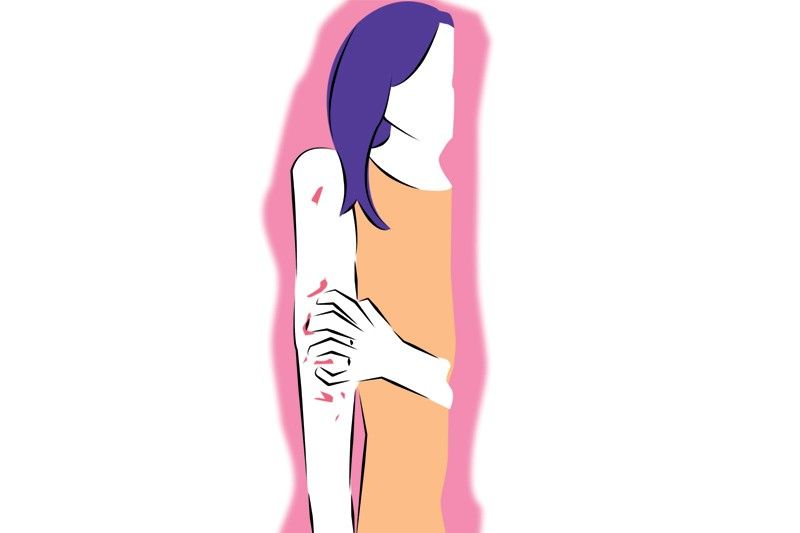Why you should be worried about itching


Itching can be incredibly irritating and frustrating. Whether you are itching due to an allergic reaction, skin irritation, or an illness, you will likely do whatever it takes to make it stop.
However, it’s important to figure out what causes the itching so you’ll know the best way to treat it and find some relief.
Itching produces the desire to scratch, which can cause even more damage to an already damaged skin and it might lead to more itching. This is called the itch-scratch-itch cycle. It may cause breaks in the skin, bleeding, infection, and in others, alteration of the skin’s appearance (thickening and darkening of skin with excoriations can occur). Itch can disrupt sleep and have a negative effect on someone’s quality of life. It’s also associated with depression and anxiety.
There are many other causes of itching and people may be affected by more than one of these health conditions.
For example, senile itch (itch in older people) can affect more than half of people aged over 70. It is usually secondary to skin dryness, but in other cases it may be aggravated by a systemic condition such as lymphoma or any other form of cancer, liver disease, diabetes, thyroid/parathyroid disease, blood disorders, infection or a neurological disorder such as stroke, etc.
Sometimes itching can be secondary to a drug that the patient is taking, such as opioids, particularly morphine and diamorphine, aspirin, antibiotics, hormone treatments, selective serotonin re-uptake inhibitors, antidepressants (citalopram, fluoxetine, paroxetine and mirtazapin), ace inhibitors (enalapril, ramipril; statins such as atorvastatin, simvastatin, pravastatin), hemotherapy drugs, and monoclonal antibodies (immunotherapy).
A detailed history of the patient should be taken: Onset (drugs, during winter), duration of itch, quality, time course (scabies), localization (notalgia paresthetica), preceding skin changes, relieving factors (atopic atmokinesis occurs while changing clothes), exacerbating factors (scratching with brushes, combs, knitting needles), atopic diathesis, drug history, history of allergies, weight loss, fever, fatigue, emotional stress, and other symptoms indicating underlying disease have to be reviewed.
Other important symptoms in diagnosing the etiology of pruritus (itching)include history of infection in family members; scabies and other parasite infection; pruritus during physical activity; cholinergic pruritus, which is often reported to be atopic; aquagenic pruritus, which is provoked by skin cooling/bathing; nocturnal pruritus with chills, fatigue, sweating, weight loss reported in lymphoma. Sleep disturbance are rare with psychogenic pruritus, whereas most types cause wakening, seasonal variations cause asteatotic/xerotic, atopic, solar urticarial and textile dermatitis.
A thorough clinical examination should be done followed by a screening test and more investigation if need be. And while waiting for the results, the patient with pruritus can do the following:
• Apply moisturizing emollients such as lotions and creams to keep the skin supple and moist. You can try emollients with anti-itch or cooling ingredients like menthol to reduce itch. Corticosteroid creams can be used but should not be used for long periods. Check with the dermatologist for advice.
• Drink plenty of water. Avoid or cut down intake of anything that can cause vasodilation (dilation of the blood vessels in the skin) like caffeine, alcohol, spices and heat.
• Use warm water for bathing for not more than 20 minutes. Add sodium bicarbonate or oatmeal to the bath water.
• Avoid soaps, shower gels and bubble baths. These can dry skin out by washing away natural oils. Use an emollient soap or nonalkaline soaps as a substitute instead.
• Pat dry rather than rubbing after bathing.
• Avoid irritating fabrics for clothes and bed sheets. Some people find soft cotton to be cooler and less irritating than synthetic fabrics.
• Keep your room at a comfortable temperature and make sure it's not too warm nor too cold at night. Consider using a fan.
• Remember, scratching can make the itch worse and create a vicious cycle.
• Avoid contact with chamomile, tea tree oil, whitening lotions or soaps etc.
• Avoid house dust, as this aggravates pruritus in Atopic dermatitis
• Avoid stress, strain and excitement.
• Wearing gloves at night can reduce damage done to the skin by scratching.
Pressing, tapping or drumming the skin, rather than scratching, can help.
• Distraction techniques, such as music, relaxation or positive imagery may help to break the itch-scratch-itch cycle.
• Providing emotional support and reassurance can help with itch caused by anxiety.
If all else fails, at least you have a fallback with the results of all the screening tests and additional tests depending on the other manifestations, history and the age of the patient.
Based on the findings, the dermatologist would most likely be able to identify the underlying cause or etiology of the patient’s pruritus or itching and prescribe the most appropriate treatment for your itching. Although in extremely rare cases, the cause may not be identifiable and your only recourse is the symptomatic treatment of the said symptom.
* * *
For inquiries, call 0917-4976261, 0999-8834802 or 8401-8411, or email gc_beltran@yahoo.com.



















